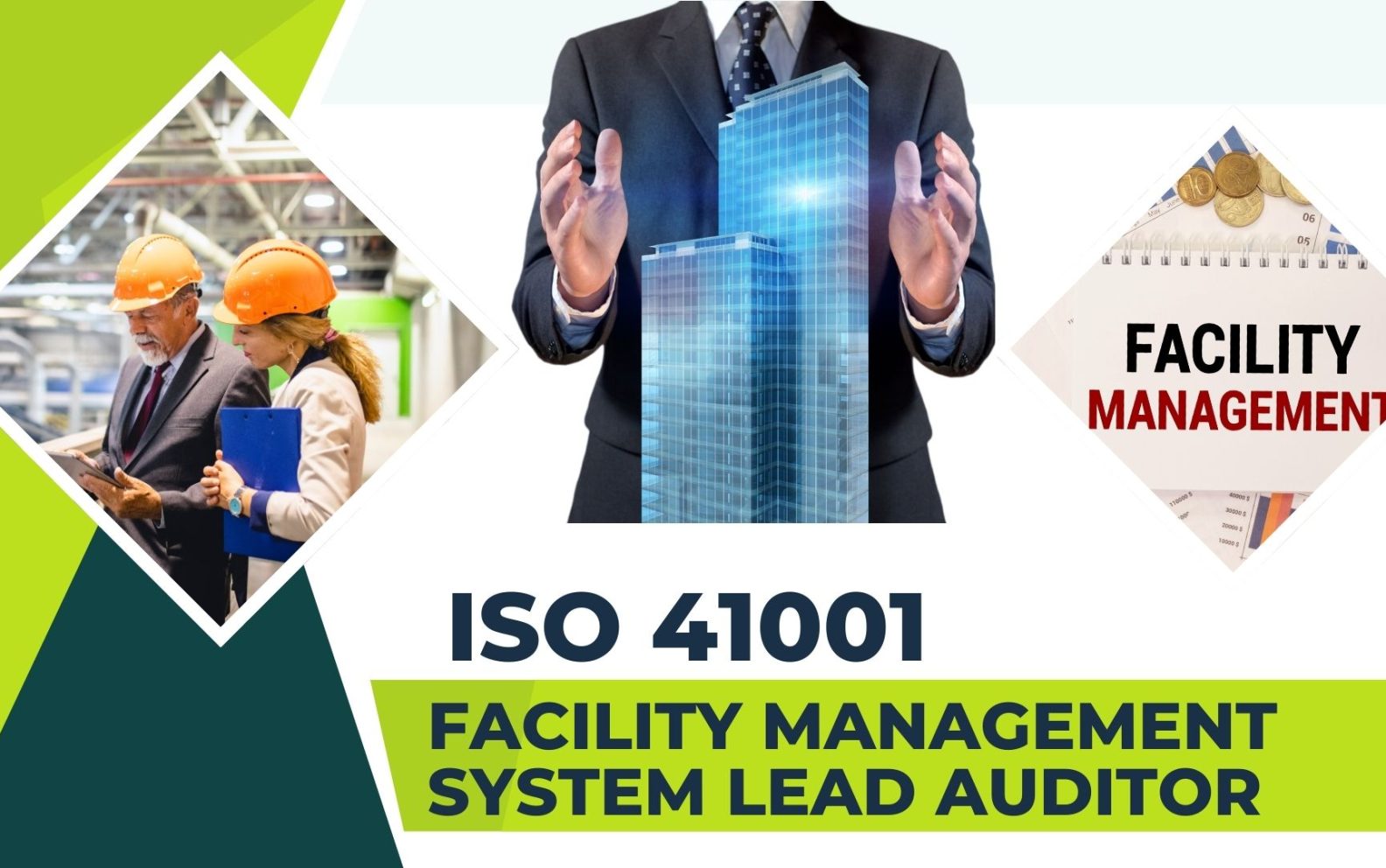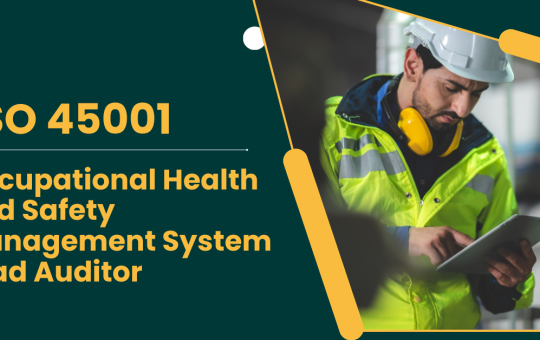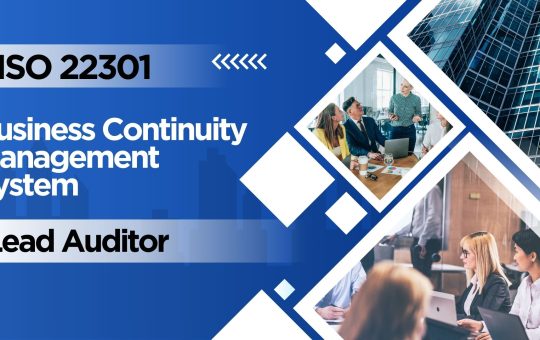
ISO 41001 Facility Management System Lead Auditor
- Global Recognition: Obtain a prestigious certification in facility management auditing.
- Enhanced Skills: Master auditing techniques specific to facility management systems.
- Efficiency Optimization: Help organizations improve operational performance and resource efficiency.
- Sustainability Contribution: Promote sustainable practices within facility management operations.
- Career Advancement: Open pathways to senior roles in auditing and facility management consulting.
- Compliance Expertise: Ensure organizations meet global standards for effective facility management.
- Understand the principles, structure, and requirements of ISO 41001 standards.
- Develop the skills to plan, conduct, and manage facility management system audits.
- Learn to evaluate resource efficiency, sustainability practices, and operational performance.
- Identify gaps and recommend strategies for continuous improvement in facility management.
- Build confidence in communicating findings and leading audit teams.
- Understand integration opportunities between ISO 41001 and other management systems.
- Introduction to ISO 41001
- Overview of Facility Management Systems and their objectives.
- Benefits of implementing ISO 41001 certification.
- Facility Operations and Resource Management
- Assessing resource utilization and operational efficiency.
- Identifying opportunities for cost reduction and process optimization.
- Audit Planning and Execution
- Preparing and managing audit schedules.
- Conducting on-site assessments and collecting evidence.
- Sustainability in Facility Management
- Promoting sustainable practices and compliance with environmental standards.
- Evaluating the effectiveness of green initiatives.
- Non-Conformance Management
- Documenting findings and addressing non-conformities.
- Developing corrective action plans for system improvement.
- Audit Reporting and Stakeholder Communication
- Creating comprehensive audit reports.
- Engaging with stakeholders and management teams to present findings.
- Continuous Improvement
- Leveraging audit results to enhance facility management practices.
- Implementing strategies for ongoing performance improvement.
- Lead Facility Management Auditor: Lead audits to optimize facility management systems.
- Facility Manager: Oversee efficient management of organizational resources and operations.
- Sustainability Consultant: Advise on sustainable facility management practices.
- Compliance Specialist: Ensure adherence to ISO 41001 and other regulatory standards.
- Operational Excellence Manager: Develop and implement strategies for continuous improvement.
- Expert Trainers: Learn from industry professionals with extensive auditing experience.
- Practical Learning: Engage in real-world scenarios and case studies.
- Global Standards Alignment: Training adheres to ISO 41001 requirements.
- Flexible Learning Options: Online and in-person classes available.
- Post-Certification Support: Access additional resources and expert advice after certification.
- High Success Rate: Proven track record of participant success and satisfaction.
Study Units
- Introduction to ISO 41001
- Overview of Facility Management Systems and their objectives.
- Benefits of implementing ISO 41001 certification.
- Facility Operations and Resource Management
- Assessing resource utilization and operational efficiency.
- Identifying opportunities for cost reduction and process optimization.
- Audit Planning and Execution
- Preparing and managing audit schedules.
- Conducting on-site assessments and collecting evidence.
- Sustainability in Facility Management
- Promoting sustainable practices and compliance with environmental standards.
- Evaluating the effectiveness of green initiatives.
- Non-Conformance Management
- Documenting findings and addressing non-conformities.
- Developing corrective action plans for system improvement.
- Audit Reporting and Stakeholder Communication
- Creating comprehensive audit reports.
- Engaging with stakeholders and management teams to present findings.
- Continuous Improvement
- Leveraging audit results to enhance facility management practices.
- Implementing strategies for ongoing performance improvement.
Upon successful completion of the ISO 41001: FMS Lead Auditor course, participants will be able to demonstrate the following professional competencies:
Audit Leadership:
Lead and manage ISO 41001 facility management system audits from planning to reporting with professionalism and confidence.Operational Evaluation:
Assess facility operations, maintenance processes, and resource utilization to identify efficiency improvements and cost-saving opportunities.Sustainability and Resource Management:
Evaluate and promote sustainable facility management practices aligned with global standards and organizational goals.Compliance and Risk Assessment:
Examine compliance with ISO 41001 requirements, legal obligations, and industry best practices to mitigate operational risks.Corrective Action and Improvement:
Identify non-conformities, analyze root causes, and recommend actionable corrective and preventive measures.Audit Communication and Reporting:
Develop clear, accurate, and actionable audit reports, effectively communicating findings to management and stakeholders.Strategic Integration:
Integrate ISO 41001 principles with other management systems (such as ISO 9001, ISO 14001, and ISO 45001) for a unified operational approach.Continuous Improvement Leadership:
Drive a culture of excellence by using audit insights to support ongoing organizational development and performance enhancement.
This course is ideal for professionals responsible for managing, auditing, or improving facility management systems in line with international standards. It is particularly suited for:
Facility Managers and Supervisors: Seeking to enhance their understanding of ISO 41001 and improve operational efficiency.
Internal and External Auditors: Aiming to gain formal qualification as ISO 41001 Lead Auditors.
Quality, Environmental, and Operations Managers: Interested in integrating facility management with ISO 9001, ISO 14001, or ISO 45001 systems.
Sustainability and Compliance Professionals: Focused on promoting resource-efficient and environmentally responsible facility operations.
Maintenance and Support Service Leaders: Responsible for ensuring optimized, compliant, and safe facility operations.
Consultants and Professionals Seeking Growth: Individuals looking to expand into auditing, sustainability, and facility management consultancy roles.
Our assessment process is designed to ensure every learner achieves the required level of knowledge, skills, and understanding outlined in each course unit.
Purpose of Assessment
Assessment helps measure how well a learner has met the learning outcomes. It ensures consistency, quality, and fairness across all learners.
What Learners Need to Do
Learners must provide clear evidence that shows they have met all the learning outcomes and assessment criteria for each unit. This evidence can take different forms depending on the course and type of learning.
Types of Acceptable Evidence
Assignments, reports, or projects
Worksheets or written tasks
Portfolios of practical work
Answers to oral or written questions
Test or exam papers
Understanding the Structure
Learning outcomes explain what learners should know, understand, or be able to do.
Assessment criteria set the standard learners must meet to achieve each learning outcome.
Assessment Guidelines
All assessment must be authentic, current, and relevant to the unit.
Evidence must match each assessment criterion clearly.
Plagiarism or copied work is not accepted.
All learners must complete assessments within the given timelines.
Where applicable, assessments may be reviewed or verified by internal or external quality assurers.
Full learning outcomes and assessment criteria for each qualification are available from page 8 of the course handbook.
Top Courses
No results found.
Related Courses
Let's Get in touch
Deleting Course Review
Course Access
This course is password protected. To access it please enter your password below:



